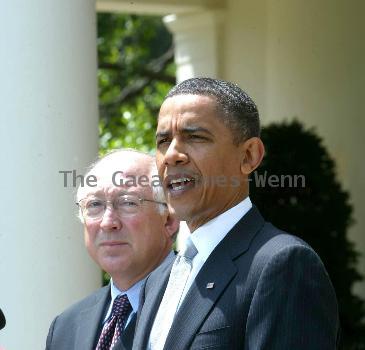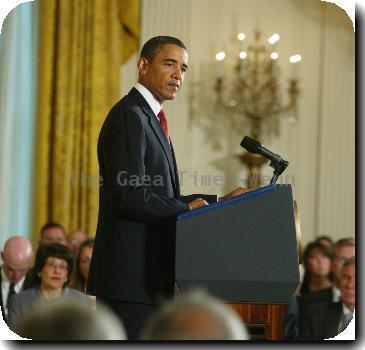AP-GfK polls show a bad economy is turning independents against Obama and other Democrats
By Trevor Tompson, APSunday, August 15, 2010
AP-GfK polls show Obama losing independents
WASHINGTON — Independents who embraced President Barack Obama’s call for change in 2008 are ready for a shift again, and that’s worrisome news for Democrats.
Only 32 percent of those citing no allegiance to either major party say they want Democrats to keep control of Congress in this November’s elections, according to combined results of recent Associated Press-GfK polls. That’s way down from the 52 percent of independents who backed Obama over Republican Sen. John McCain two years ago, and the 49 percent to 41 percent edge by which they preferred Democratic candidates for the House in that election, according to exit polls of voters.
Independents voice especially strong concerns about the economy, with 9 in 10 calling it a top problem and no other issue coming close, the analysis of the AP-GfK polls shows. While Democrats and Republicans rank the economy the No. 1 problem in similar numbers, they are nearly as worried about their No. 2 issues, health care for Democrats and terrorism for Republicans.
Ominously for Democrats, independents trust Republicans more on the economy by a modest but telling 42 percent to 36 percent. That’s bad news for the party that controls the White House and Congress at a time of near 10 percent unemployment and the slow economic recovery.
“People are just struggling, they need a job but there’s nowhere to get a job,” said independent Leilani Buxman, 55, of Greeley, Colo. Of Obama, she said, “It seems like he talks but he doesn’t do anything about it.”
Both parties court independents for obvious reasons. Besides their sheer number — 4 in 10 describe themselves as independents in combined AP-GfK polling for April, May and June — they are a crucial swing group.
To try winning them over, Republicans say they will contrast Obama’s campaign promises of change with the huge spending programs he’s approved. Democrats say they will warn independents that a GOP victory will revive that party’s efforts to cut taxes for the rich and transform Social Security into risky private investment accounts.
Targeting independents is tricky, though, because the makeup of independents evolves over time.
Their numbers have swollen from 3 in 10 two years ago, due partly to the weakened political loyalties that typify years without presidential elections. While some are conservatives dissatisfied with Republicans, similar numbers are disillusioned Democrats, underscoring a frustration with the party in power often seen when the economy is bad.
Reflecting these conflicting dynamics, today’s independents are likelier to be minorities, conservatives, less educated, lower paid and from rural areas than they were in 2008. Sixty-seven percent think the country is heading in the wrong direction, compared with 59 percent of all voters who think so.
“Why not stop bickering and do something. Pull together,” said Chip A. Hoeye, 54, of Fort Atkinson, Wis., an independent and Obama voter who says he doesn’t care which party controls Congress because of their constant battling.
Independents trust Republicans far more than Democrats for handling national security, but give Democrats a 42 percent to 36 percent edge for dealing with health care — a potential sign that distrust over Obama’s signature issue is receding.
Hope is not lost for Democrats.
The AP-GfK polls show a narrow 44 percent to 41 percent overall preference for a Democratic Congress. The party is holding its 2008 edge among women and urban residents, and still splitting the vote of pivotal suburbanites and people earning $50,000 to $100,000.
But less than three months from Election Day, independents aren’t the only part of Obama’s 2008 coalition that shows waning enthusiasm for a Democratic-controlled Congress.
Other groups that supported Obama but show less fervor include young whites, unmarried women, people who live in the West, people earning under $50,000 a year, college graduates and urban whites. The falloff shows that Democrats have work to do with blocs the party hoped an Obama presidency would cement into dependable supporters.
There’s even erosion among minorities. While 8 in 10 voted for Obama, fewer than two-thirds want a Democratic Congress, and 1 in 9 don’t care which party controls.
Democrats are also losing further ground with GOP-leaning groups such as white men, married men and people earning over $100,000 a year.
Ebbing support for Democrats, compared with the vote for Obama, partly reflects that a president’s popularity doesn’t necessarily help his party in Congress. It also comes as Obama’s own image has suffered: 49 percent approve of his job performance in the AP-GfK polls, compared with 67 percent who approved in February 2009, days after he took office.
The data from the AP-GfK polls combines surveys conducted June 9-14, May 7-11 and April 7-12 by GfK Roper Public Affairs & Media. A total of 3,047 randomly chosen adults were interviewed by cell and landline telephone. The margin of sampling error is plus or minus 2.4 percentage points.
The exit poll for the November 2008 presidential election was conducted by Edison Media Research and Mitofsky International for the AP and television networks in 300 precincts nationally. The data was based on 17,836 voters, including telephone polling of 2,407 people who voted early, and has a margin of sampling error of plus or minus 1 percentage point.
Associated Press News Survey Specialist Dennis Junius and reporter Christine Simmons contributed to this report.
Online:
AP-GfK Poll: www.ap-gfkpoll.com
Tags: Barack Obama, North America, Political Organizations, Political Parties, Public Opinion, United States, Washington

